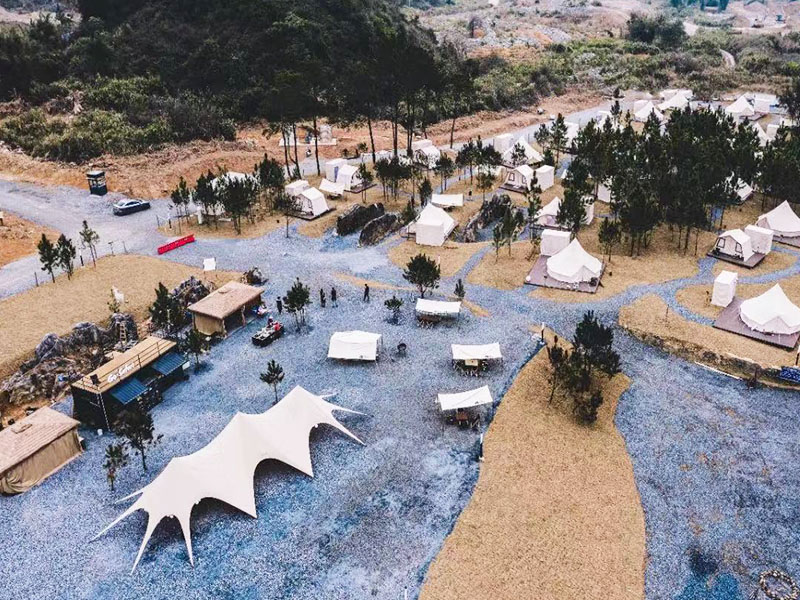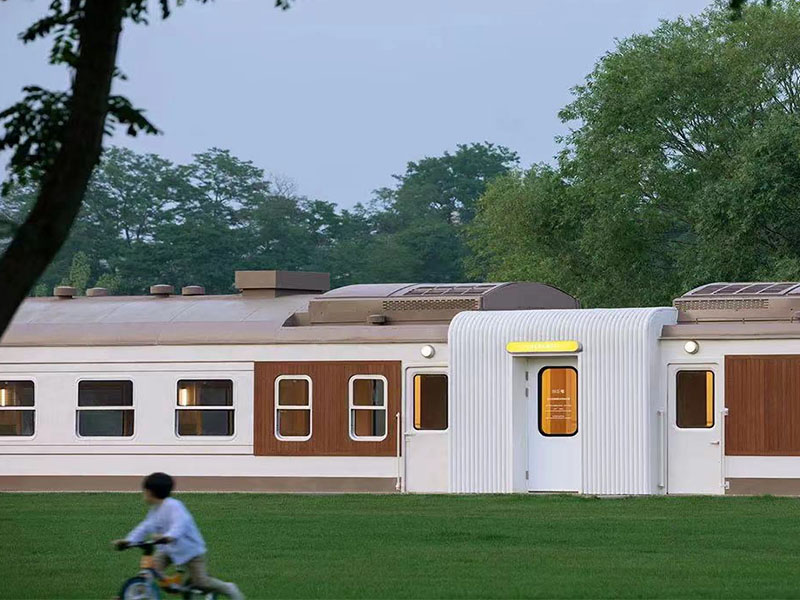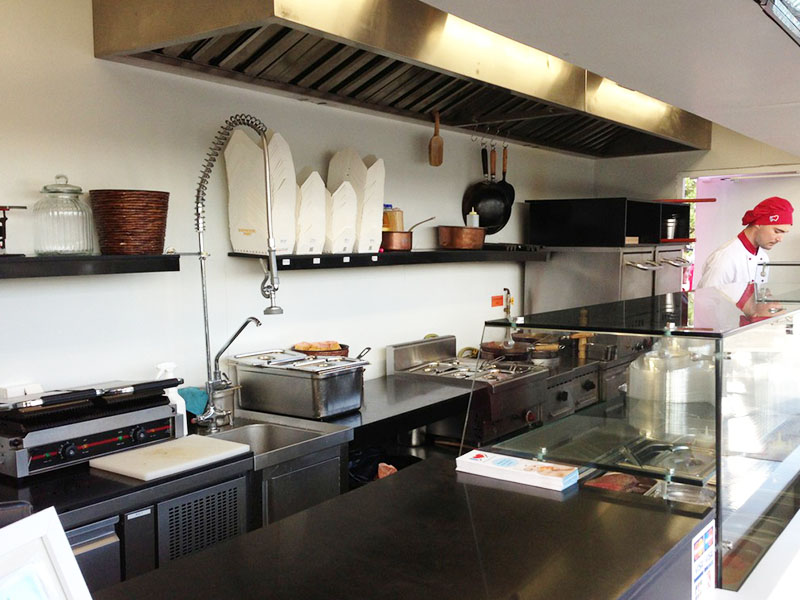Prefabricated camp hotels have become increasingly popular due to their efficiency, functionality, and adaptability. These modular buildings offer a convenient and cost-effective solution for accommodating workers in remote areas. They provide comfortable living spaces, recreational facilities, and dining areas, all in one package.
A commercial kitchen plays a crucial role in a camp hotel, as it is responsible for providing nutritious meals to the residents. It needs to be designed with efficiency and functionality in mind, ensuring that the kitchen staff can prepare and serve meals effectively. The design considerations include optimizing space, ensuring seamless workflow, and incorporating the necessary equipment and storage solutions.
Modular solutions for commercial kitchens in camp hotels offer numerous advantages. They can be customized to fit the specific needs and requirements of the hotel, allowing for efficient use of space and resources. These modular kitchens can be prefabricated off-site and quickly assembled on location, minimizing construction time and disruption to the surrounding area.When considering the integration of a commercial kitchen into a prefabricated camp hotel, cost considerations are essential. It is crucial to find a balance between cost and design, ensuring that the final result is both budget-friendly and perfectly suited to the hotel's culinary needs.
Prefabricated camp hotels offer a range of benefits that make them an attractive option for various industries, including tourism, construction, and resource extraction. These modular structures are designed to be quickly assembled and disassembled, providing a flexible and cost-effective solution for temporary accommodations.
One of the key advantages of prefabricated camp hotels is their portability. These structures can be easily transported to remote locations, allowing businesses to set up temporary accommodations in areas where traditional hotels may not be available. This is particularly beneficial for industries that require a mobile workforce, such as construction projects or mining operations.
Another benefit of prefabricated camp hotels is their efficiency. These modular buildings are designed to optimize space utilization and provide comfortable living quarters for guests. The use of standardized components and construction processes ensures consistent quality and reduces construction time, allowing businesses to quickly establish accommodations for their workforce.
In addition, prefabricated camp hotels are often equipped with modern amenities and facilities. This includes comfortable sleeping quarters, recreational areas, and dining facilities. The integration of a commercial kitchen in a prefabricated camp hotel is particularly important, as it allows businesses to provide high-quality meals for their guests. A well-equipped commercial kitchen can cater to the dietary needs and preferences of guests, ensuring a satisfying dining experience.
Furthermore, prefabricated camp hotels are a sustainable option. These structures are designed to be energy-efficient, with features such as insulation and efficient heating and cooling systems. The use of modular construction also minimizes waste and reduces the environmental impact compared to traditional construction methods.
Overall, the benefits of prefabricated camp hotels make them an ideal choice for businesses in need of temporary accommodations. The integration of a commercial kitchen in these structures ensures that guests can enjoy quality meals while staying in a comfortable and convenient environment.
When it comes to running a successful camp hotel, one of the key factors that can make or break the guest experience is the quality of the food and dining options available. This is where the importance of a well-equipped and functional commercial kitchen comes into play.
A commercial kitchen in a camp hotel serves as the heart of the culinary operations, providing a space for food preparation, cooking, and storage. It is essential for ensuring that guests are served delicious meals that meet their dietary preferences and requirements.
One of the primary advantages of having a commercial kitchen in a camp hotel is the ability to offer a wide range of menu options. Whether it's a buffet-style breakfast, a la carte lunch, or a fine dining experience for dinner, a well-equipped kitchen allows for the preparation of diverse and high-quality meals.
Additionally, a commercial kitchen enables efficient and streamlined operations. With the right equipment and layout, chefs and kitchen staff can work together seamlessly, ensuring smooth service and timely delivery of meals to guests. This not only enhances the overall guest experience but also maximizes productivity and minimizes the risk of delays or errors.
Furthermore, a commercial kitchen in a camp hotel plays a crucial role in maintaining food safety and hygiene standards. With proper storage facilities, temperature control systems, and adherence to food handling protocols, the risk of foodborne illnesses can be significantly reduced. This is especially important in a camp hotel setting where guests may have varying dietary needs and sensitivities.
In conclusion, a well-designed and fully equipped commercial kitchen is of paramount importance in a camp hotel. It allows for the preparation of diverse and high-quality meals, ensures efficient operations, and maintains food safety standards. By investing in a top-notch commercial kitchen, camp hotels can provide their guests with an exceptional dining experience that sets them apart from the competition.

Designing a commercial kitchen for a prefabricated camp hotel requires careful consideration of various factors to ensure functionality, efficiency, and safety. Here are some key design considerations to keep in mind:
Space Optimization: In a prefabricated camp hotel, space is often limited. It is essential to maximize the use of available space by designing a kitchen layout that allows for efficient workflow and easy movement of staff. Consider incorporating compact appliances, storage solutions, and workstations that can be easily integrated into the modular structure.
Equipment Selection: When choosing equipment for the commercial kitchen, prioritize durability, energy efficiency, and ease of maintenance. Opt for commercial-grade appliances that can withstand heavy use and are designed for the specific needs of a hotel kitchen. Consider the size and capacity of the equipment to ensure it fits within the available space.
Ventilation and Fire Safety: Proper ventilation is crucial in a commercial kitchen to remove heat, smoke, and odors. Install a robust ventilation system that meets local building codes and regulations. Additionally, ensure the kitchen is equipped with fire suppression systems, such as fire extinguishers and sprinklers, to mitigate the risk of fire hazards.
Hygiene and Sanitation: Maintaining high standards of hygiene and sanitation is essential in a commercial kitchen. Choose materials and finishes that are easy to clean and sanitize, such as stainless steel countertops and non-slip flooring. Install proper drainage systems to prevent the buildup of water and ensure the kitchen is equipped with handwashing stations and adequate storage for cleaning supplies.
Ergonomics and Safety: Consider the comfort and safety of kitchen staff when designing the layout. Ensure workstations are ergonomically designed to minimize strain and fatigue. Install non-slip flooring and proper lighting to reduce the risk of accidents and injuries.
By carefully considering these design considerations, you can create a commercial kitchen in a prefabricated camp hotel that is efficient, functional, and meets the specific needs of your guests and staff.

When it comes to integrating a commercial kitchen into a prefabricated camp hotel, modular solutions offer a range of benefits and advantages. These innovative and flexible solutions are designed to meet the unique needs and requirements of camp hotels, providing efficient and functional kitchen spaces.
Modular commercial kitchens are constructed off-site and then transported to the camp hotel location. This approach allows for faster installation and minimal disruption to the hotel's operations. The modular components, such as kitchen units, countertops, and appliances, are pre-fabricated and easily assembled on-site, saving time and reducing construction costs.
One of the key advantages of modular solutions is their adaptability. Camp hotels often have limited space, and modular kitchens can be customized to fit the available area perfectly. Whether it's a small kitchen for a boutique camp hotel or a larger kitchen for a larger facility, modular solutions can be tailored to meet the specific needs and requirements of the hotel.
In addition to their flexibility, modular commercial kitchens are also designed for efficiency. The layout and design of the kitchen can be optimized to ensure seamless workflow and functionality. This includes considerations such as the placement of appliances, workstations, and storage areas, as well as the integration of ventilation and plumbing systems.
Furthermore, modular solutions for commercial kitchens in camp hotels are designed to meet industry standards and regulations. This includes ensuring proper ventilation, fire safety measures, and food hygiene standards. By choosing a modular solution, camp hotels can be confident that their commercial kitchen meets all necessary requirements.
Overall, modular solutions offer an efficient, cost-effective, and customizable option for integrating a commercial kitchen into a prefabricated camp hotel. With their adaptability, efficiency, and compliance with industry standards, modular commercial kitchens are the ideal choice for camp hotels looking to provide high-quality culinary experiences for their guests.

When it comes to integrating a commercial kitchen into a prefabricated camp hotel, cost considerations play a crucial role. While the benefits of a commercial kitchen are undeniable, it's important to carefully evaluate the financial implications to ensure a successful integration.
One of the primary cost considerations is the initial investment required for the commercial kitchen equipment. High-quality, durable appliances and fixtures are essential for a functional kitchen that can withstand the demands of a camp hotel environment. However, these top-of-the-line equipment can come at a higher price point. It's important to strike a balance between cost and quality, ensuring that the chosen equipment meets the specific needs of the camp hotel while staying within budget.
In addition to the equipment costs, ongoing operational expenses should also be taken into account. Commercial kitchens require regular maintenance, cleaning, and repairs, which can add to the overall cost of running the kitchen. It's important to factor in these expenses when budgeting for the integration of a commercial kitchen into a prefabricated camp hotel.Furthermore, the cost of staffing the kitchen should be considered. Hiring skilled chefs and kitchen staff who can handle the demands of a commercial kitchen can be a significant expense. It's important to carefully assess the staffing needs and budget accordingly to ensure the kitchen operates smoothly and efficiently.Lastly, it's essential to consider any additional costs associated with necessary permits, licenses, and inspections for the commercial kitchen. Compliance with health and safety regulations is crucial, and the associated fees should be factored into the overall cost considerations.
By carefully evaluating these cost considerations and budgeting accordingly, camp hotels can successfully integrate a commercial kitchen that meets their culinary needs while maintaining financial sustainability.
Keywords: Prefabricated Hotel Kitchen
Originally published 11 Oct 2023, updated 11 Oct 2023.
Get a Project Quote
Our representative will contact you soon